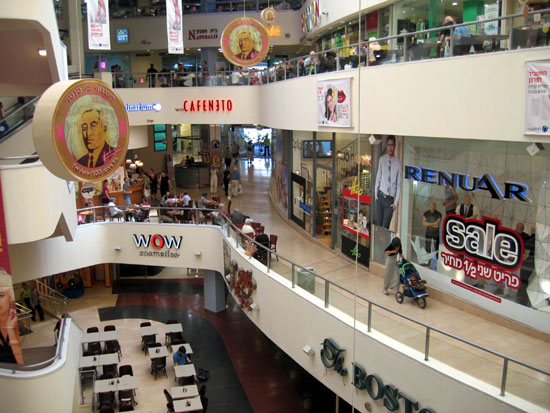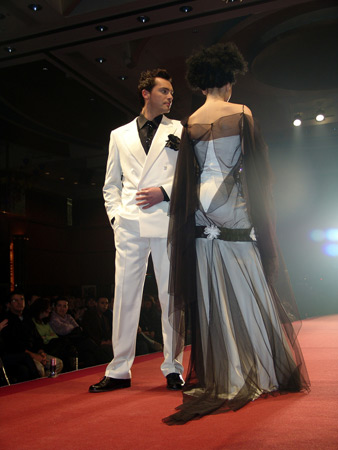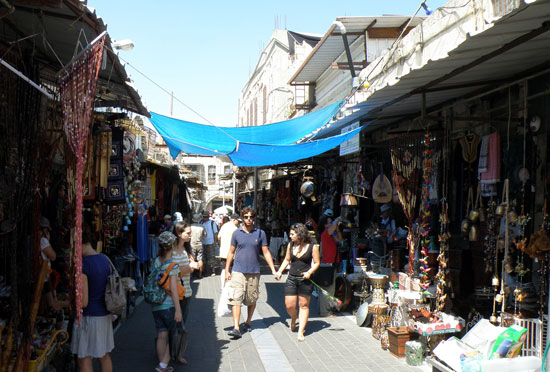Tel Aviv is Israel’s fashion capital, and it constantly produces new trends that compete on the world stage. It is hard to fight back the inner (or outer) materialist when walking around the city. Bridal gown shops, couture boutiques, second-hand clothing stores, and shops with cheap, trendy clothing and catchy t-shirt slogans line the streets. Israel carries some of the usual European brands, like Zara, Mango, and Castro. Despite being at the hub of Middle Eastern style, Tel Avivans are casual people who somehow look like they rolled out of bed looking fabulous.
At the same time, high fashion is balanced with the cheap and tacky. Particularly along Allenby Street, one can find storefronts displaying tacky ball gowns and chintzy power suits, and King George Street has an open-air market and shop after shop brimming with discounted wares and misspelled Japanese t-shirts. Tel Aviv puts on a good show: it displays its best face to the world at large and leads the country in fashion, but it can’t hide its own constant struggle for economic survival.
Hours of Operation
Shops typically open around 10 am, and closing times vary. The workweek runs from Sunday to Thursday, so don't put shopping off until Friday night or Saturday. Although Tel Aviv is quite secular, many businesses still close on the Jewish Sabbath when the streets are generally quieter. Many stores close mid-afternoon on Friday. However, everything is back to the usual hustle and bustle first thing Sunday morning.
Major Shopping Districts
While clothing options are innumerable, the arts flourish in Tel Aviv too. Gordon Street is the place to go to browse upscale art galleries. On Tuesdays and Fridays the Nachalat Binyamin street fair takes place, where local artists sell beautiful and affordable pieces that make great gifts. Art lovers must also wander through the romantic artists’ quarters in Jaffa. Tel Aviv is littered with galleries and boutiques, so one is likely to encounter the arts culture on virtually any stroll.
At some point going to the mall became a national sport in Israel. Azrieli, Dizengoff, and Ramat Aviv Malls feature typical mall ware, from high-end brands to kitsch. Most malls in Israel are also good places for souvenirs, gifts, designer brands, and independent labels.
Tel Aviv flea markets, such as Shuk HaPishpeshim in Jaffa and the antiques market in Dizengoff Square on Tuesdays and Fridays, can yield some exceptional finds for the shopper of a different frame of mind. Florentin is a good neighborhood for checking shops full of industrial materials. The Levinsky spice market is also here. The Shuk HaCarmel (Carmel market) sells food as well as cheap underwear, CDs, belts, and the like.
South of Yehuda HaLevi Street and Rothschild Boulevard is the refurbished Gan HaHashmal (the Electric Garden). Formerly a run-down area (following closure of the power plant that gave it its name), it was revitalized by—you guessed it—young artists. Now it’s the place for cutting-edge fashion made by up-and-coming designers who can’t afford the rent on Dizengoff.
Literally meaning "the station," HaTachana is an old train station outside Neve Tzedek on the seam of Tel Aviv and Jaffa that has been redesigned as a pedestrian market with cafés, restaurants, art galleries, retail shops, and an organic food market. The train once connected Jaffa to Jerusalem, and the old style of its station, including the tracks, have been preserved. Shops include quality Israeli brands like Naama Bezalel and Michal Negrin.
Copyright © 1993-2025 World Trade Press. All rights reserved.





